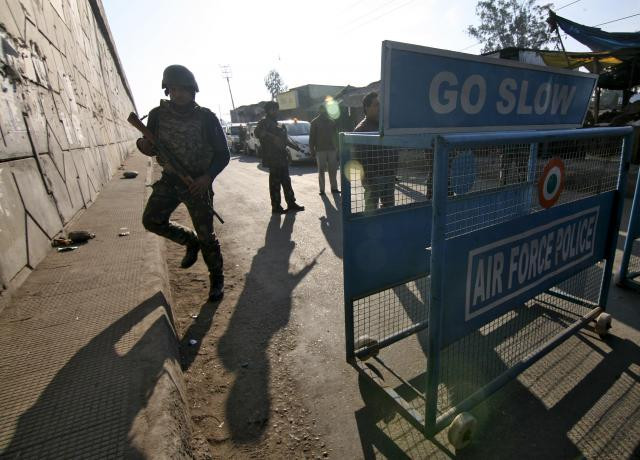Punjab forms JIT to examine leads in Pathankot attack
FO says Islamabad will continue to extend full cooperation

Indian security personnel stand guard next to a barricade outside the Indian Air Force (IAF) base at Pathankot in Punjab, India, January 2, 2016. PHOTO: REUTERS
The Punjab government has formed a five-member joint investigation team (JIT) to investigate the Pathankot airbase attack case, which was registered a week ago in Gujranwala. A JIT is mandatory to probe cases lodged under the anti-terror law.
The newly formed team will be headed by the same person who heads the six-member Special Investigation Team (SIT) formed earlier by Prime Minister Nawaz Sharif.
India seeks details of probe, SIT visit from Pakistan
The JIT comprises Punjab Counter Terrorism Department (CTD) AIG Rai Tahir as the convener and Intelligence Bureau Lahore Deputy Director General Azim Arshad, Inter-Services Intelligence’s (ISI) Lt Col Tanvir Ahmed, Military Intelligence’s Lt Col Irfan Mirza and Gujranwala CTD Investigating Officer Shahid Tanveer as members. Irfan and Azeem are also members of the SIT.
On February 18, the Punjab counter-terrorism police had registered an FIR under sections 302, 324 and 109 of the Pakistan Penal Code related to murder, attempt to murder and abetment, and sections 7 and 21-i of the Anti-Terrorism Act of 1997.
The case was registered against unidentified suspects for carrying out the three-day siege of Indian Air Force base in Pathankot beginning on January 2 that left six militants and seven Indian security personnel dead.
The FIR was lodged on the recommendations of the SIT formed by the premier in the week of January after India had provided evidence suggesting the attack was planned and handled from Pakistan. The team had, however, termed the proof inadequate to book the suspects, including Jaish-e-Mohammad chief Masood Azhar, named by India.
While the JIT will start the inquiry in view of the registered FIR, the SIT would investigate on the leads provided by New Delhi. Both JIT and SIT would work within their mandate and scope.

Islamabad vows support
Despite the reservations expressed by India, Pakistan reaffirmed its commitment on Thursday to extending all-out support to India for investigating the attack, which has derailed the prospects of peace between the two neighbours.
Pakistan registers case over Pathankot attack
“Terrorism is not only Pakistan’s problem but also of the region and the world at large for which we all need to cooperate with each other,” said Foreign Ministry spokesperson Nafees Zakaria at his weekly briefing In Islamabad.
He added the SIT formed by Islamabad to help India find out the perpetrators of the attack would visit India shortly. “Since the time India approached us, we have extended full cooperation,” he said.
Reacting to a statement by the Indian defence minister asking Pakistan to “do more”, Zakaria said Pakistan’s efforts to eliminate terror within the country, and its immense sacrifices had been acknowledged by the international community, including the US leadership.
Afghan reconciliation
About the recent announcement of direct talks between Kabul and Taliban, Zakaria said all Taliban factions had been invited for the dialogue with the Afghan government.
A day earlier, Zabihullah Mujahid, the spokesperson of the main Taliban faction led by Akhtar Mansour, had claimed the group was unaware of any such invitation, saying they were not officially contacted by Kabul.
The joint press statement released on Tuesday after the fourth meeting of the Quadrilateral Coordination Group (QCG) stated all groups had been invited for direct talks scheduled to take place in the first week of March in Islamabad.
When asked to comment on reports suggesting the insurgent group had set preconditions for joining the peace process, the FO spokesperson said that it was decided with consensus that talks under the QCG initiative would be without any preconditions.
Zakaria said the four-nation bloc had a joint responsibility to move the reconciliation process forward and make direct dialogues between Kabul and various Taliban groups and others possible. “Peace in Afghanistan is very important for regional stability and progress,” he maintained.
Published in The Express Tribune, February 26th, 2016.



















COMMENTS
Comments are moderated and generally will be posted if they are on-topic and not abusive.
For more information, please see our Comments FAQ